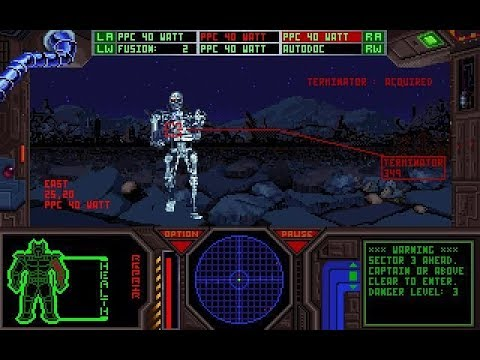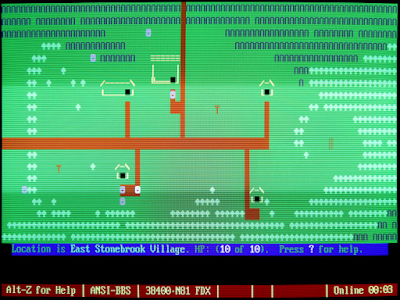Premise.
This blog post is useless. And rambling. As it's useless the machine I'm typing this on, a Pentium 3 subnotebook from the 90ies. You have been warned!
But, it might be entertaining, and I suspect many of the people doing what I do and reading what I write, are in a similar demographic and might be starting to be nostalgic, thinking of their formative years and wondering if they're worth revisiting...
Objectives.
I wanted to find a DOS machine, not for retrogaming (only), but to do actual "work". Even more narrowly, I had an idea of trying to compile an old DOS demo I made in the nineties, the only production of a short-lived Italian group called "day zero deflection" (you won't find it).
Monotasking. No internet. These things are so appealing to me right now. One tries to escape the dopamine rush of doomscrolling on all the connected devices that surround us. The flesh is weak, and instead of trying to muster the required willpower, shopping for a hardware solution seems so much more attractive. Of course, it's a fool's errand, but hey, I said this post was going to be useless.
A Long, intermezzo of personal history.
(skip this!)
It's interesting how memory works. So non-linear, and unreliable. I used a lot of computers in my life, and I started early, I began programming around six or seven years old.
This past Christmas, as the pandemic eased up, I was able again to fly and spend time with my family in southern Italy. Found one of the Commodore 64 we had.
 |
| The c64 in question. Yes, it needed some love - albeit to my surprise, all my disks worked, with my childhood code! The video glitch is actually a quite mysterious defect, but it's a story for another time... |
We, because I grew up with my older cousins, my mother is the last of eleven siblings, so I have a lot of cousins, many close to my house as my family used to be farmers, and thus had land that eventually became buildings, with many of my aunts and uncles ending up living in the same park.
These older cousins taught me programming, and I was using their computers before having my own. In fact, the c64 I found is most likely theirs, as mine was eventually donated to some relative that needed it more.
I remember a lot of this, in detail, albeit I don't know anymore what details are real and what ended up as images remixed from different time eras.
We were in the basement of my aunt's villa, just next door to the building I grew up in, where we had an apartment on the top floor. We would transfer things between the two by lowering a rope from the balcony down to the villa's garden. Later, when we had PCs and network cards, we moved bits between the buildings, having suspended a coax cable that ran from the second floor of my building (where another cousin lived) to my floor, to the villa.
The basement was originally the studio of my uncle, who was the town's priest. I was named after him. He and one of his sisters died in a car accident when I was little, so I am not sure I really remember of him, sadly.
But I remember the basement, the Commodore 64, and later an 8086 with an external hard drive the same size and shape as the main unit. An amber monitor monochrome I think, or perhaps it was both amber and green, with a configuration switch.
I remember all of the c64 games we played, easily. I remember bits of my coding journey, the books we used to study, and once my cousin being dismayed that I could not figure how to make a cursor move on the screen (the math to go to the next/previous row), even if it was mostly a misunderstanding.
I remember playing with my Amiga 600 there too, Body Blows - I switched to the Amiga after visiting... another cousin, this time, in Milan.
I remember the first Pentium they had because it allowed me to use more 3d graphics software. 3d studio 4 without having to resort to software 387 emulation! At the time I had an IBM PS/2 with a 486sx which the seller persuaded my father would be better than a 486dx another guy was offering us - who needs a math coprocessor, and IBM is a much better brand than something home-made... And I know that numerous times I lost all the data on these computers that I did not own, often by typing "format" too fast and putting the wrong drive letter in.
And then, nothing? Everything more modern than that I sort of lost, or rather, becomes more confused. I know the places I went shopping for (pirated) software and hardware, maybe some of the faces, not sure.
I know used to lug my PC tower for the few kilometers that separated my house in Scafati from the "shop" (really a private apartment) that I used to go to in Pompei, as I was a kid, and did not have a car of course.
And that tells me that I had lots of different PC configurations over the years, LOTS of them, AMD, Intel, Voodoo cards, a Matrox of some sorts, even a Sound Blaster AWE32 at a point, a CD-ROM and the early CD games, I remember the excitement for each new accessory and card, and the intense hate for cable and thermal management, especially on more modern setups.
I remember scanners, the first were hand-held (Logitech ScanMan, then Trust), printers, joysticks, graphics tablets when I got into photography, the very first digital camera I had (I think an Olympus). It's all "PC" for me, I have no idea of what I was using in which year.
At a point, around university, I switched to primarily using laptops. Acer or Asus, something cheap and powerful but they would break often (cheap plastics). Then finally the MacBook Pro, and that one has remained a constant, still today my primary personal machine.
So. My nostalgia is about three machines, really, even if I had dozens. The Commodore 64, the one I remember the most. I am eager to play around with that one more, I ordered all sorts of HW, but I have no intentions to use it "daily" - that one belongs to a museum.
 |
| The MisterFPGA c64 core is great and can output 50hz! |
The Amiga, which for some reason I don't care as much for anymore, I suspect mostly because I was using it primarily for games so I did not create as much on it - I think that was the key.
I had some graphic programs, but I was not a great 2d artist (DeluxePaint) and I did not understand enough of the 3d tools I happened to get my hands on (Real3D, VistaPro)... and I did no coding on it. At a point, I had a (pirate) copy of Amos, but no manual.
Swapping disks, real or virtual, is also not fun.
And then the PC, specifically the 486sx that I used both for programming again (QBasic, PowerBasic, Assembly then C with DJGPP), for graphics (Imagine, then Lightwave among others), photography, the internet...
That 486 captures all of my PC memories, even if I know it's wrong. For example, during my C demo-coding times, I must have had a different computer, because the demo we were making would never run on a 486, they were sVGA, I even remember coding our sVGA layer, fixing a bug in the Matrox VESA bios - they were out of spec, not setting the viewport to be the same as the screen resolution when changing the latter, and many demos did run with the wrong line pitch because of that. Not mine! And the demo was, for some reason, writing buffers in separate R,G,B planes, with some MMX code I made to then shuffle them back into the display frame.
So, it could not have been the 486 - but this is great, it gives me the freedom of not trying to recreate a particular setup but instead going for that same feeling and toolset I remember using, on an entirely different system.
What do we "need"?
Here's the plan. First and foremost, we'll get a laptop, because I don't have space in my apartment, no, in my life, for retrocomputing desktop or tower. Also, I want to go to hipster coffee shops and write on my hipster retro workstation, as I am doing right now.
I planned, regardless of the machine I would end up getting, to rip out the cells from the battery pack and reconstruct it - batteries are mostly a liability in old computers and I prefer the weight savings of not having them - this also means, technically, "luggable" computers could be considered.
We will look for:
- Something fast, because if I'm buying something it must be the best I can get! I don't even care about being period-accurate, this will be a monotasking monster, not a museum piece.
- Something I can program on, because hey, what if I like it and want to make modern retro-demos? Ideally, this means a Pentium I, Pentium Pro, or Pentium MMX, beautiful in-order CPUs with predictable pipelines I still know how to cycle-count (sort-of). But anything less than the dreadful Pentium 4 will do, P2 and P3s are OOO but still understandable enough.
- RAM is not an issue really, and we will max out whatever configuration we will settle on.
- Storage is not a problem either, because we will replace whatever HDD the machine comes with an SSD (yes, an actual SSD, albeit most people use compact-flash adapters instead) via an mSATA to PATA/IDE 2.5' enclosure which can fit any half-size ssd (I got a 64gb one just to be "safe" as you never know the limits of old motherboards and firmware. You do want to make sure that the machine did originally support hdds of a decent size (tens of gb) though.
- DOS-compatible (SoundBlaster-compatible) soundcard, is a must.
- A TFT screen, also is a must. The resolution doesn't really matter, but we want something as modern as possible because old LCDs were really terrible. Ideally, 640x480 would get us the best DOS compatibility, but in practice, it's not a problem.
- Ideally an sVGA card with good VESA/VBE compatibility, and with good scaling from the VGA resolutions (640x480 text, 320x200 graphics) to whatever the LCD resolution is (that means, either integer-scaling and the right LCD resolution or good quality filters when upsampling).
- An USB port is highly recommended, as we want to be able to plug in a USB storage device to easily transfer files from and to modern, internet-connected machines. Setting up networking, using PCMCIA cards, etc would be much more painful.
- We want a good keyboard. And, because we can, we want something cool looking, maybe an iconic piece of design, not some random garbage brand. Also, something that is easy to service.
- Reasonably priced. There is no way I burn 1000$ on this just because certain hardware is right now "hot", I find it borderline immoral.
Expectations vs Reality.
After long, long deliberations, research on forums, scouting eBay and so on, I landed on an IBM ThinkPad 240x. The ThinkPads are amazing machines, easy to service, iconic, with great keyboards and the TrackPoint is useable in a pinch.
 |
| Beautiful! Pro-tip, a bit of 303 protectant makes the plastics look as new! |
I paid around 200$ for it, you will see people getting these for 5$ at a garage sale or stuff like that, but I'm ok paying more for something that the seller verified it's running, has no issues, and so on. More than that I think is crazy, but you do you...
When it arrived it looked amazing. Yes, it had scratches on the top, and even some hairline cracks, one near a hinge and one on the bottom of the chassis, but these are not a problem as I planned to disassemble the thing anyway, see if I needed to clean the internals, replace batteries, check for any leak, re-apply thermal paste if needed and so on.
Regardless of how much research you have done, the reality of the actual machine will surprise you in good and bad ways.
All the hardware setup was trivial, and all the things I thought would be hard were not.
I gutted the battery as planned (the cells were already a bit bulging). I feared the most for the initial OS setup, but my strategy worked flawlessly. I bought an IDE-to-USB adapter, connected the SSD in its SSD-to-IDE enclosure, and mapped it as a virtual drive in a VirtualBox VM with Windows 98.
That allowed me to use Win98's fdisk and format to create something I knew would be recognized by the ThinkPad - I was not sure at all the same would have happened with modern tools. For extra safety, I also made two partitions under 2GB, to be able to format them with fat16, and the remainder of space was left in a third partition using fat32.
Installing the OS was a breeze, and Lenovo still hosts all the latest IBM drivers - Windows 98 just works.
The first tiny hurdle I had to overcome was with the firmware update, IBM tools are adamant about having a charged battery to perform the update... which I clearly did not have. But in reality, the tool just calls a second executable, and even if the binaries have different extensions than the default the flashing tools wanted, it did not take too long to figure out the right switches to use.
Upgrading the OS was also trivial, some people made install packs with all the official patches and lots of unofficial fixes (used mdgx ones, htasoft is an alternative), I just grabbed one and it mostly worked. The only issue I had is that the first time around the OS stopped booting with some DMA error, but disabling a specific patch having to do with enabling DMA on drives solved the issue. Re-installing the OS via the SSD is relatively fast, and I also used an old copy of Norton Ghost to create snapshots.
To my surprise, even USB in DOS mostly worked (via Bret Johnson's drivers, albeit many options exist). It is not 100% reliable, nor it's fast... but it does work! Same for the TrackPoint, via cutemouse.
I ended up with the classic config.sys/autoexec.bat multiple-choice menu for things like emm386 and so on, I remember these being so painful to deal with, but in this case, it was all easy, probably also because this machine has so much RAM.
That is not to say there aren't problems. There are, but in a way, luckily for me, they seem to be unfixable, so I don't need to spend a ludicrous amount of time trying to overcome them (alright alright, I already did spend more time than it's worth, using DOSBox-debug and a few different decompilers to reverse an audio TSR... but I won't anymore I swear). And I did not foresee them.
First, there is the VGA. I obsessed over resolutions, because I knew, that most laptops of this time do not do resolution scaling well. I had an epiphany though that allowed me to stop worrying about it. It's true that ideally, 640x480 makes you not have to worry about scaling. But! Laptops with 640x480 screens tend to be incredibly crappy and small LCDs, so much so, that the unscaled 640x480 area on a more modern laptop (say, an 800x600 panel) ends up covering a bigger screen estate and looking better!
So, problem solved, right? Yes. If you get a card with good firmware! Unfortunately, the laptop I got has an obscure chipset that not only has crappy VESA/VBE support but is also not software-patchable via UniVBE.
Some TSRs help a bit (vbeplus, fastvid), adding more modes by using other resolutions and forcing the viewport to clip, and you can play around with caching modes, but most DOS sVGA demos do not work.
TBH, that was just plain unlucky, most laptops would not be this bad at sVGA... but expect I guess to find at least one bit of "unlucky" hardware you did not think about in your machine.
The other issue is with DOS audio and this is a biggie.
Yes, I paid attention, and I got a chipset that does support DOS SoundBlaster emulation. But OMG, nobody told me it was going to be this crappy! It's basically useless, with most software just not working at all, especially when it comes to digital audio. The OPL3 FM music fares better, it tends to work, albeit it might not sound great.
It's sad but most DOS software, especially demos, have a much higher chance of running in Windows 98 than in pure DOS, as when Windows is loaded the audio emulation is much, much better.
This is something that apparently one simply has to live with. No PCI sound card has great DOS support, now I learned, especially with laptops, as DOS audio support for PCI relies on a combination of the right soundcard, the right motherboard and the right firmware.
It doesn't help that often, when people online report audio working in DOS, they mean dos-under-windows, not pure dos... And you get a laptop from the pre-PCI era, then you're likely on a 486 or less, which not only will be worse in all other areas - but also many of these laptops used not to bundle any audio card at all, so they are strictly worse.
That's not to say that there are no Pentium laptops with built-in ISA audio - there are, and probably I was again unlucky with the 240x being a rare combination of a dos-compatible-ish PCI on a "bad" motherboard (apparently using the intel 440mx chipset which does not support DDMA), but again... expect some issues, there are no perfect laptops, and even back in the day, there was hardly a configuration that would run everything flawlessly...
Conclusions.
Was it worth it? Should you do it? Yes and no...
 |
| It's small! |
For retro gaming, or in general, passive consumption (demos, etc), it's overall a terrible idea, I'm pretty confident all laptops would be terrible, and even most desktops.
The early PC landscape was just a mess of incompatible devices, buggy, unpatched software, and crashes. You were lucky when things worked, and this is true today as well. DosBox is a million times more compatible than any real hardware. Yes, it has bugs, and lots of things can be more accurate, but on average it is better than real hardware.
There are many DosBox builds out there, and I'm sure this is going to be quicky outdated, but at the time of writing I recommend:
- On Windows, primarily DosBox-X
- I also keep vanilla for debugger-enabled builds - you can even get a dosbox plugin for ida pro, but that's for another time, and DosBox-ECE
- On Mac, Boxer - Madds branch and vanilla DosBox on Mac
- Last time I tried, DosBox-X had issues on Mac with the mouse emulation - might have been fixed by now.
On windows, and especially if you care about Windows of any kind, there is 86box (a fork of PCem) which is a lower-level, more accurate emulator. DosBox does not work great even with Win3.11, for some odd mouse emulation problems that seem to be different in each fork.
If like me, you want to experience a monotasking machine that you can grab for a few hours at a time to play with a simpler, more focused experience, then I'd say these laptops are great fun!
I'm even collecting a bit of a digital retro-library by mirroring old websites, often grabbed from the Wayback machine, and grabbing old magazines from the Internet Archive, to recreate the kind of reading materials I had back then...
Overall, setting this up took me less time and energy than tinkering with a Raspberry Pi or say, trying to install a fully functional Linux on a random contemporary laptop. It's one of the least annoying projects I have embarked upon.
My conscience feels ok too. It won't become garbage, I hate clutter, I hate having too much stuff, too many things I don't need in my life, especially digital crap that creates more problems than it really solves... With this one, I know I can sell or donate the hardware the moment I don't want to use it anymore, it's not going to be in a landfill, it's not another stupid gadget with a short lifespan.
The best part, all the software is portable, DOS doesn't really care about the hardware, you only need to replace a few lines in your config.sys if you have specific drivers... so I can migrate all I have on this laptop to a DosBox setup (even today I do keep the two in sync) or a different machine.
Not bad. You want to try? Luckily it's easy, this is what I learned! You don't have to stress over the hardware (as I did), because none is perfect.
I went for something relatively "modern", a laptop that would have ran in its prime Windows 98/NT/2000 - and "downgraded" it to do mostly DOS - I think that's a good choice, but I don't think this ended up working much better or worse than any other option I was considering.











